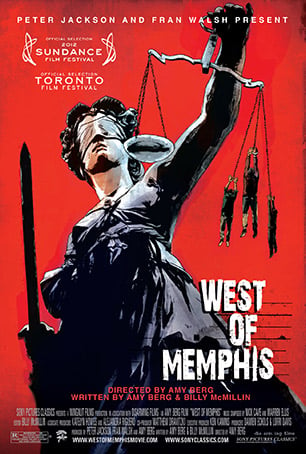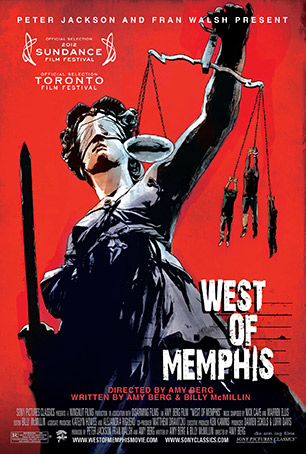West of Memphis offers a gripping insight into how those who administer justice can be complicit in egregious injustice. Get the DVD and support Truthout by clicking here.
 (Image: Sony Pictures.)Director Amy Berg’s West of Memphis is a searing indictment of prosecution misconduct in the conviction of three poor white teenagers for the barbarous 1993 murders of three young boys. Three young men, vulnerable to prosecution because they were – according to one person interviewed in the film – “white trash” (and therefore powerless and subject to stereotype by the justice system and mass media) spent 18 years in prison. Berg’s carefully documented account makes a riveting argument for the innocence of Jessie Misskelley, Damien Echols and Jason Baldwin – and how their conviction served the interests of those within the justice system, but not justice.
(Image: Sony Pictures.)Director Amy Berg’s West of Memphis is a searing indictment of prosecution misconduct in the conviction of three poor white teenagers for the barbarous 1993 murders of three young boys. Three young men, vulnerable to prosecution because they were – according to one person interviewed in the film – “white trash” (and therefore powerless and subject to stereotype by the justice system and mass media) spent 18 years in prison. Berg’s carefully documented account makes a riveting argument for the innocence of Jessie Misskelley, Damien Echols and Jason Baldwin – and how their conviction served the interests of those within the justice system, but not justice.
What emerges in West of Memphis (the case also was covered in a series of three HBO documentaries, the Paradise Lost series, and is the subject of a fictionalized account, Devil’s Knot, by Canadian director Atom Egoyan, released this year) is a portrait of a justice system based on political self-interest, laziness, ineptitude and closing a case at all costs. Up to the moment that the three convicted defendants were released, key judicial players, members of the prosecution and politicians had an interest in maintaining the validity of the original conviction despite evidence that had emerged to the contrary.
Berg, in her director’s notes to the film, describes corruption within judicial systems using the phrase “just us.” She elaborates that “the term encapsulates the idea that rather than an equitable court of justice, there are only authorities who control the system.”
Truthout regularly exposes acts of injustice meted out by the “justice system.” Usually they involve powerless people as targets – or advocates who challenge the status quo. The latter was covered extensively by Truthout in the case of Tim DeChristopher,
who spent nearly two years in federal prison for, in essence (despite the technical charges), becoming a national spokesperson to resist climate change, the fossil fuel industry and political lackeys.
In the case of the horrific killings of three 8-year-olds in West Memphis, Arkansas, in 1993, the criminal justice system resorted to using explosive but unproven charges of satanic cult murders. Given that the crime was so ghastly, the police needed to offer up defendants to the public, even if based on the flimsiest of “proof.” Meanwhile, the chief prosecutor resorted to apparent perjury to sway the jury and called upon a highly unqualified pathologist to errantly corroborate “evidence.”
The law enforcement and judicial system known as “just us” not infrequently has a lot to gain in trumping up a case, particularly when there are political futures at stake for prosecutors and judges. The police are motivated to pin the crime on someone and satisfy the public desire for vengeance and closure. When evidence to the contrary arises, the circle of “just us” closes tightly around itself and refuses to admit error.
Jessie Misskelley, Damien Echols and Jason Baldwin were fortunate in that Echols’ wife, Lorri Davis, was unrelenting in seeking out those who could prove his innocence. West of Memphis was initiated by Lord of the Rings director Peter Jackson and his collaborator and wife, Fran Walsh. They sought out Berg who writes that she was persuaded to take on the exhaustively researched documentary because, “I understood that this was a story that not only exposed a frightening failure of justice within our legal system, but exposed a judicial culture where innocence did not matter.”
In 2010, the Arkansas Supreme Court found grounds for a retrial. However, facing the uncertainty of many in the justice system still wanting to convict them, Misskelley, Echols and Baldwin had their lawyers negotiate rarely used Alford pleas with the state of Arkansas. This allowed them to assert their innocence but also allowed the prosecution to maintain their guilt. The agreement allowed them to be released in August 2011 based on their time served in prison without exonerating them.
Although the film presents evidence that a relative may have been responsible for the murders, neither the West Memphis Police Department nor prosecutors pursued the case any further. Prosecutors and the police generally make it a policy never to admit mistakes or misconduct, therefore the real guilty parties – in wrongful convictions such as the Memphis Three – sometimes go free.
The release of the Memphis Three from prison is bittersweet. They are free again but still officially guilty of child murder.
Furthermore, without the attention of celebrities, films and books that brought a national focus on their case, they likely would be in prison still, with Echols – who was given the death sentence – perhaps executed by now.
“West of Memphis” is a damning documentary of how easily the justice system can be manipulated to fulfill the motives of law enforcement and prosecutors.
After its mesmerizing unraveling of a gross injustice, one is left thinking about how many persons are serving time or have been executed who have never had the Klieg lights of Hollywood focused on their wrongful convictions.
Matching Opportunity Extended: Please support Truthout today!
Our end-of-year fundraiser is over, but our donation matching opportunity has been extended! Today, all donations to Truthout will be matched dollar for dollar. Your one-time gift today will be matched immediately. As well, your monthly donation will be matched for the whole first year, doubling your impact.
This matching gift comes at a critical time. Trump has made it no secret that he is planning a demolition-style attack on both specific communities and democracy as a whole, beginning on his first day in office.
Help us prepare for Trump’s Day One, and have your donation matched today!
